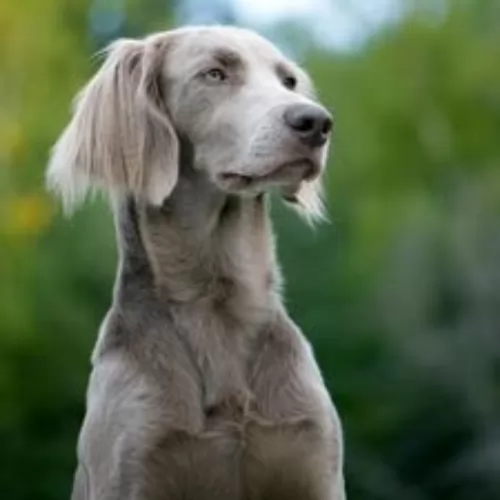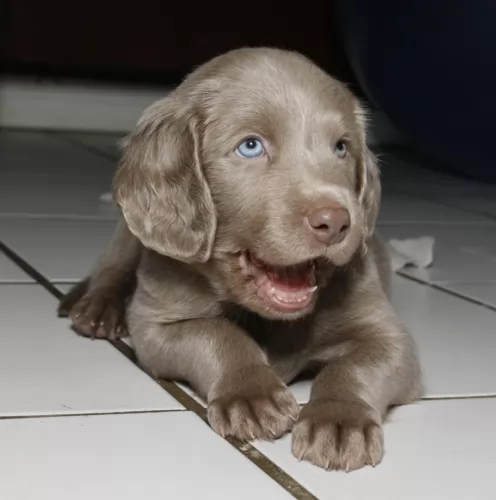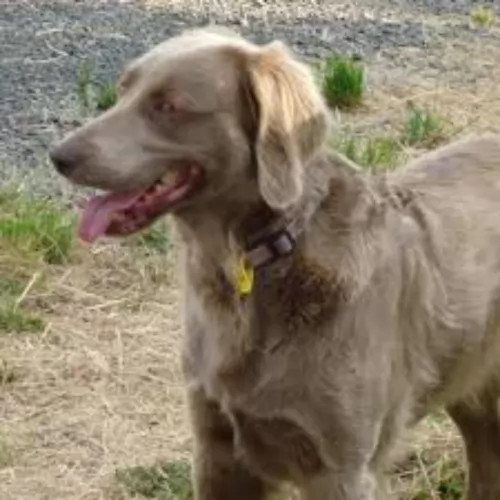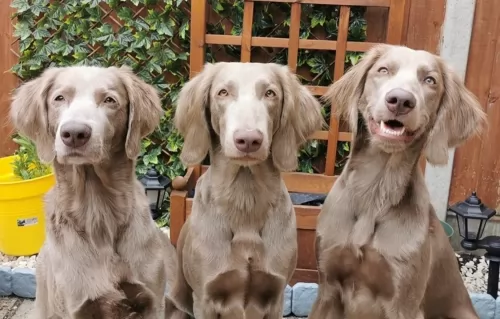 Petzlover
Petzlover Latvian Hound is originated from Russia but Longhaired Weimaraner is originated from Germany. Latvian Hound may grow 22 cm / 8 inches shorter than Longhaired Weimaraner. Latvian Hound may weigh 20 kg / 44 pounds lesser than Longhaired Weimaraner. Both Latvian Hound and Longhaired Weimaraner has same life span. Latvian Hound may have more litter size than Longhaired Weimaraner. Latvian Hound requires Low Maintenance. But Longhaired Weimaraner requires Moderate Maintenance
Latvian Hound is originated from Russia but Longhaired Weimaraner is originated from Germany. Latvian Hound may grow 22 cm / 8 inches shorter than Longhaired Weimaraner. Latvian Hound may weigh 20 kg / 44 pounds lesser than Longhaired Weimaraner. Both Latvian Hound and Longhaired Weimaraner has same life span. Latvian Hound may have more litter size than Longhaired Weimaraner. Latvian Hound requires Low Maintenance. But Longhaired Weimaraner requires Moderate Maintenance
 The Latvian Hound is a medium sized Russian or Latvian hunting hound. The dog was bred in Latvia, Russia.
The Latvian Hound is a medium sized Russian or Latvian hunting hound. The dog was bred in Latvia, Russia.
He was developed from a number of English and Polish dogs as well as Lucernese breeds.
It is by no means a new breed and records of it go way back to the 1600s. A certain Duke Courland developed the dog so that it was also known as the Courland Hound. In 1922 the Latvian Association of Hunters' Associations was formed.
It was in 1971 that the Latvian Hound was was approved with it's name and a new standard was developed and approved. It isn't recognized by the AKC or the FCI.
 You may be used to the sleek, silver shorthaired Weimaraner, but did you know you get a beautiful long haired version too? Known also as the Long Coated Weimaraner or the ‘Gray Ghost’, with its mesmerising amber eyes, the less common long haired variety shares a similar history as the more familiar short haired version.
You may be used to the sleek, silver shorthaired Weimaraner, but did you know you get a beautiful long haired version too? Known also as the Long Coated Weimaraner or the ‘Gray Ghost’, with its mesmerising amber eyes, the less common long haired variety shares a similar history as the more familiar short haired version.
The dog originates in Germany and was developed to be a hunting dog. It is believed that the silver dog dates back to the early 1800’s, and in 1897 the first breed club in Germany was formed to protect the future of this dog.
The longhair coat is recognized in all countries except the American Kennel Club.
 The Latvian Hound is a medium sized dog standing at between 40 to 48cm in height and weighing about 15 to 20kg.
The Latvian Hound is a medium sized dog standing at between 40 to 48cm in height and weighing about 15 to 20kg.
He has a deep chest, fairly long, floppy ears, a long tail with strong legs. The coat is double and is short, shiny and dense. He is an average shedder. He is essentially black with tan markings, with tan spots above the eyes. The eyes are dark brown and the nose is black.
The Latvian Hound may well be an exceptional hunter but he also makes a great family pet. He is looked upon as being a friendly, amicable, sweet dog.
Because he has been a working dog, he likes to be busy and will happily join in with all your hikes and swimming. He will also run with you while you cycle.
It’s a dog that doesn’t like to be left alone for long periods of time, being inclined to suffer with separation anxiety. He doesn’t take kindly to strangers either, but a dog which has been socialized and trained becomes more amicable.
Your Latvian is intelligent so you won’t have any trouble teaching him some simply commands. He is a friendly, lively dog and just having him in your home brings in a joyous atmosphere. He is an easy-going dog, but even so, if you don’t have a fair sized garden and you don’t have the time to exercise him, he is better off living on a farm or where there is a fair sized garden.
 The Longhair Weimaraner with its eye-catching grey coat is a large dog that stands between 58 and 70cm and weighs between 25 to 40kg.
The Longhair Weimaraner with its eye-catching grey coat is a large dog that stands between 58 and 70cm and weighs between 25 to 40kg.
These dogs, unlike the short haired version, have the tail traditionally long and the tail is feathered. The eyes are a blue-green, amber or grey color. The grey coat is soft and silky and even though it is quite long, a brush twice a week will keep it in tip-top condition.
The Longhaired Weimaraner’s temperament is the same as the short haired variety. He is also a superb field dog with excellent hunting skills.
They’re very active dogs, looking for plenty of mental and physical stimulation. For first-time dog owners, this might prove to be too demanding, so the long haired Weimaraner might not be the best first-choice dog to get.
They can be aggressive when meeting new people and he will certainly require training and socialization if you want him to be calm and obedient.
 The Latvian Hound is an outgoing, fun dog to have around and a great dog for first-time dog owners too. He has always been a working dog, so he has developed skills such as being focused and tenacious.
The Latvian Hound is an outgoing, fun dog to have around and a great dog for first-time dog owners too. He has always been a working dog, so he has developed skills such as being focused and tenacious.
As a companion and family dog, you will have a true friend as he is sweet, loving and loyal and thrives on the attention of his human family. He is a playful dog, feisty and energetic, and will be protective too. Bring him into your home and you'll see what a bright place it becomes just having him there as pet and friend.
 Your Long Haired Weimaraner is a friendly, alert dog that makes for an excellent companion and watchdog. The fact that he is also restless, confident, independent and strong-willed means that training and socialization will be necessary to make him pleasant and obedient.
Your Long Haired Weimaraner is a friendly, alert dog that makes for an excellent companion and watchdog. The fact that he is also restless, confident, independent and strong-willed means that training and socialization will be necessary to make him pleasant and obedient.
You can’t always count on him to be amicable as he also has a bit of an aggressive side.
The way your Long Haired Weimaraner turns out will depend on heredity, the personality of the owner as well as training and socialization.
These dogs want to be with their human family and will follow the owner around and contentedly lie at their feet. Once he's trained, the Weimaraner is guaranteed to make you a fine family companion.
 The life span of the Latvian Hound is 12 to 14 years, and while there are no reported major health issues, all dogs face some kind of medical issues during their lives. The Latvian Hound can face things like hip dysplasia, eye problems, bloat and ear infections.
The life span of the Latvian Hound is 12 to 14 years, and while there are no reported major health issues, all dogs face some kind of medical issues during their lives. The Latvian Hound can face things like hip dysplasia, eye problems, bloat and ear infections.
Vaccines can protect your dog from contracting some illnesses which can be fatal.
There is controversy over pet vaccines but the problem is more about HOW the dog is vaccinated.
There was a time when puppies were vaccinated many times, but newer guidelines were updated in 2017, stating that core vaccines be given to adult dogs in intervals of 3 years or more, rather than every year.
Puppy vaccines still need to be done about every 3 weeks between the ages of 6 and 16 weeks against the likes of parvovirus and distemper. Get yourself a good vet who is skilled and safe with vaccines.
 Hip Dysplasia is a medical threat to all dog breeds and fortunately the Weimaraner is a dog breed that has a low rate of dysplasia. When buying a Long Haired Weimaraner, try and get one from breeders who have had their breeding dogs hip-tested.
Hip Dysplasia is a medical threat to all dog breeds and fortunately the Weimaraner is a dog breed that has a low rate of dysplasia. When buying a Long Haired Weimaraner, try and get one from breeders who have had their breeding dogs hip-tested.
You’ll notice that the Weimaraner is a deep-chested dog and he is prone to bloating, which can turn out to be life threatening for your dog if not treated immediately.
The stomach twists and is swollen with no bowel movements. The dog is restless and in distress and needs immediate attention. To help, instead of giving one large meal which is gobbled up quickly, give him 2 smaller meals.
Skin allergies are also quite common in these dogs and you don’t want your silver dogs coat going off as it is his crowning glory.
If he is scratching, his skin is dry, red and itchy, get him to the vet as it can even be parasites at work, causing an allergic reaction.
 The Latvian Hound has a short coat that is easy to groom. He is a moderate shedder and brushing him twice a week will take care of all that loose hair. He’ll thrive on the attention this grooming session gives him and its the time to check him over for ticks and fleas too.
The Latvian Hound has a short coat that is easy to groom. He is a moderate shedder and brushing him twice a week will take care of all that loose hair. He’ll thrive on the attention this grooming session gives him and its the time to check him over for ticks and fleas too.
Check the inside of his ears. Without even realizing it, dirt and wax can build up and result in an ear infection. His ear may be red and you’ll notice him shaking his head and scratching at his ears. Be very careful about cleaning his ears as going to deep can damage the ear.
Any grooming of your dog that you can’t manage can be attended to by professional dog groomers.
 When you bring a Long Haired Weimaraner home, you will need to invest in brush and comb for his long hair. They’re active dogs and love nothing more than running in a field, rolling in mud and being very active.
When you bring a Long Haired Weimaraner home, you will need to invest in brush and comb for his long hair. They’re active dogs and love nothing more than running in a field, rolling in mud and being very active.
His coat will need to be brushed at least twice a week to keep it looking silvery and shimmering. Check the ears, eyes and teeth whenever you brush him and get used to cleaning his teeth regularly too.
If in doubt about how to keep your pet well groomed in terms of looks and health, speak to a dog expert, your vet or professional groomer.
Your ‘Gray Ghost’ dog has been a very successful hunting dog, and they are high-energy gun dogs. As a large dog he will have particular nutritional needs to fuel his energetic lifestyle.The dog’s high activity levels need to be taken into account when looking at his diet.
Buy the best commercially manufactured food. Add to his kibble some cooked chicken, brown rice or pasta and cooked or raw vegetables from time to time as well as bits of raw meat. Your dog will thank you for keeping his meals simple but nutritious.